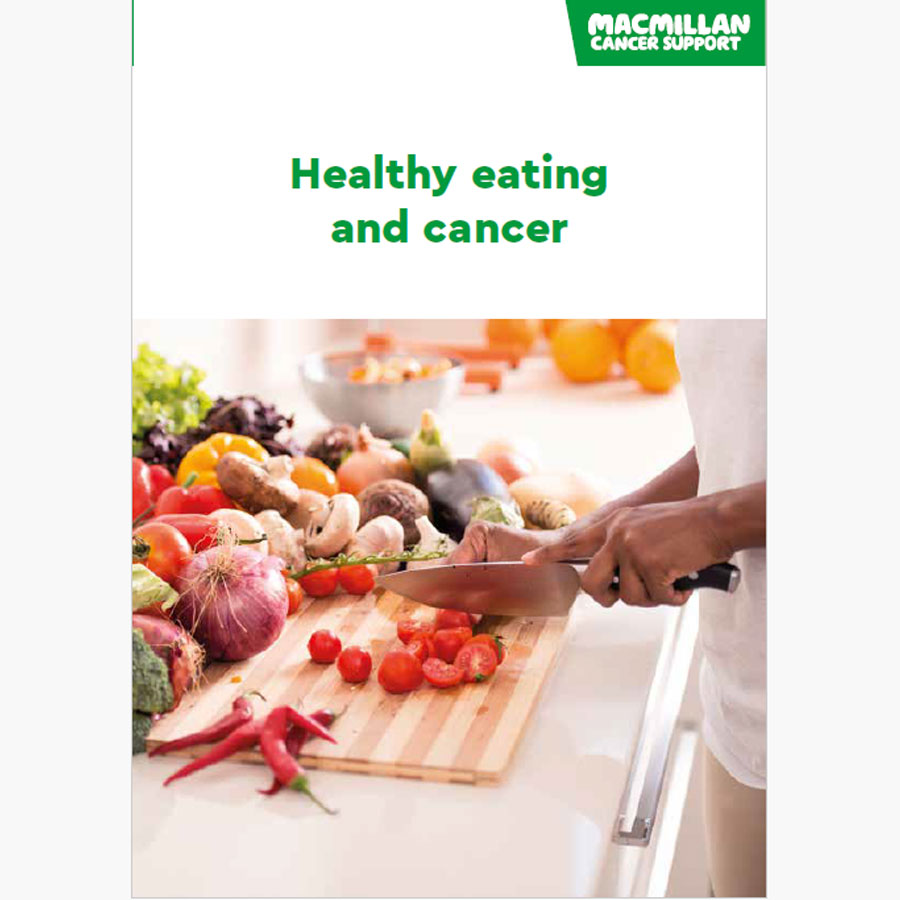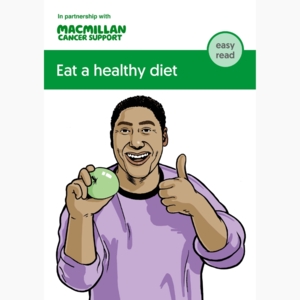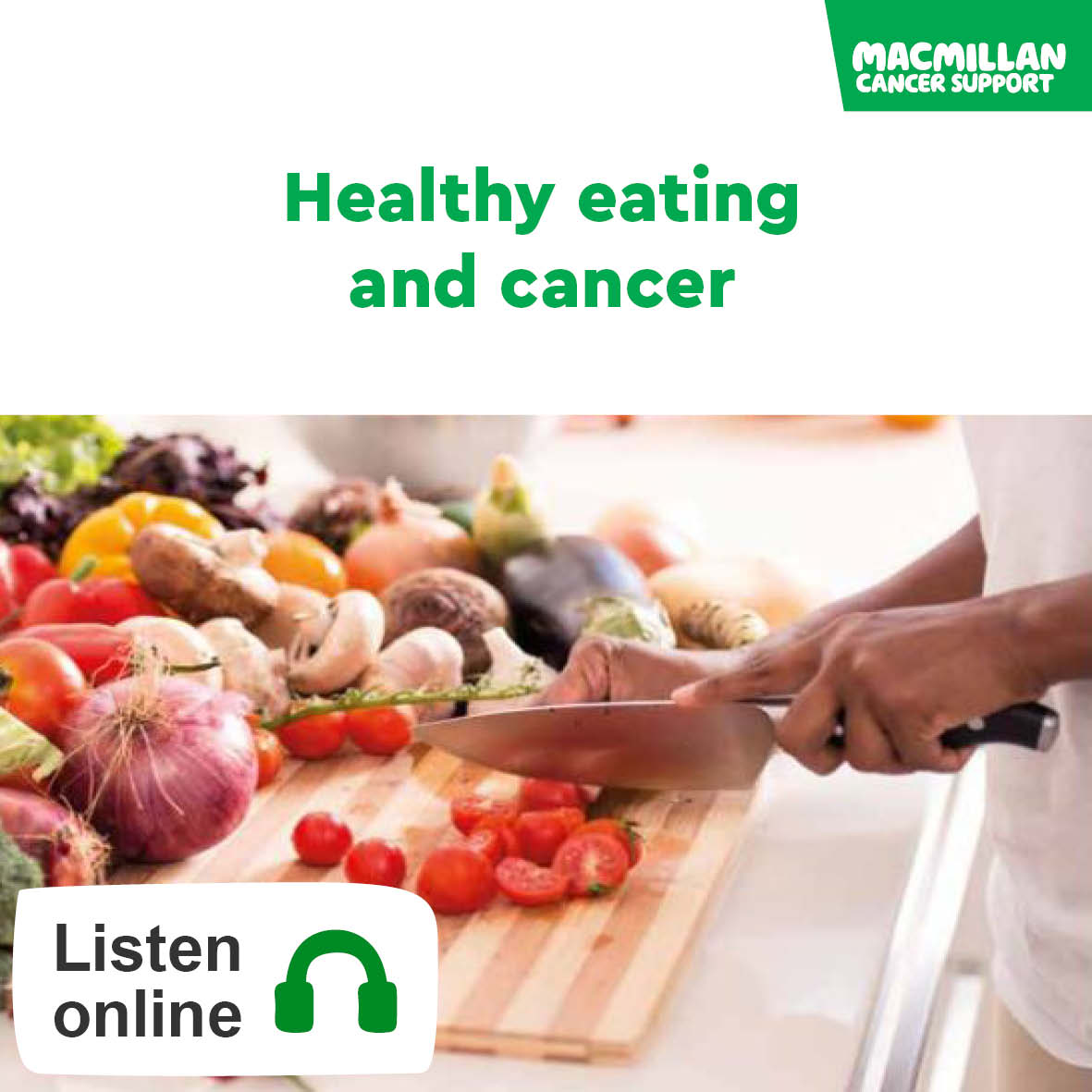Healthy eating and cancer
A healthy, balanced diet and keeping to a healthy weight can help lower your risk of some types of cancer and other diseases, such as heart disease, diabetes and stroke. Healthy eating can support your health during and after cancer treatment.
Diet and cancer
Our diet, how active we are, and our weight can all affect our risk of cancer.
Scientists still do not completely understand the link between diet and the risk of developing cancer. Some foods may increase our risk of cancer, but others may protect us. For example, research suggests that eating more fibre may reduce the risk of certain cancers. Eating a lot or red and processed meat may increase the risk of bowel cancer.
Research also shows that being overweight increases the risk of getting some types of cancer. Our weight depends on what we eat and how much physical activity we do.
Other things can also affect our weight, such as:
- medical conditions
- our genetic makeup
- our environment
- our mental well-being.
A healthy, balanced diet and regular exercise can help us keep to a healthy weight. This can help reduce the risk of some cancers and is also good for our general health. There is also evidence that drinking alcohol can increase the risk of getting some cancers. If you want to drink alcohol, follow the national guidelines.
We have answers to some common questions about food and cancer.
In the video below, dietitian Jane Clarke talks about how eating healthily can help maintain your wellbeing and reduce the risk of some cancers. She also answers frequently asked questions about diet and cancer.
View the video without BSL interpreter on our YouTube Channel.
Booklets and resources
Why is a healthy diet important?
Having a healthy, balanced diet is one of the best choices you can make for your overall health. This includes thinking about what you drink, and how much.
A healthy, balanced diet gives you all the nutrients you need to keep your body working well. Many people find that following a healthy, balanced diet helps them feel that they are doing something positive for their well-being.
Eating well and keeping to a healthy weight will help you:
- feel stronger
- increase your energy levels
- keep your immune system healthy
- improve your well-being.
It can also help reduce the risk of new cancers and other diseases, such as heart disease, diabetes and stroke. After cancer treatment, some people have a higher risk of other health problems, including:
- diabetes
- heart disease
- osteoporosis (bone thinning).
Your cancer team will tell you if you are at higher risk of other health problems. If you are, it is important to follow a healthy diet to help prevent them.
If you gain or lose a lot of weight during or after cancer treatment, you may need to be referred to a dietitian. They can offer advice on what may help.
What is a healthy balanced diet?
A healthy, balanced contains a variety of foods, in the right amounts. The main groups of nutrients are carbohydrates, proteins, vitamins and minerals, fats, fibre and fluids. A healthy balanced diet for each day includes:
- lots of fruit and vegetables – at least 5 portions a day
- plenty of starchy foods (carbohydrates) – choose wholegrain types such as wholemeal bread, brown rice or pasta, or noodles, couscous and potatoes, yams and cassava
- some protein-rich foods, such as lean meat, poultry, fish, nuts, eggs and pulses (beans and lentils)
- some milk and dairy foods, such as cheese and yoghurt, or dairy alternatives.
Limit foods that are high in fat and sugar. This is because they often do not have any additional vitamins or minerals. High-fat or sugary foods give you a large amount of energy, but they can cause weight gain.
Try to drink water or unsweetened squashes that contain no added sugar. You can also drink tea and coffee (without sugar).
Try to reduce the amount of processed and red meat you eat. This includes sausages, bacon, cured meats and reformed meat products. Limit red meat to 1 or 2 portions per week.
You should also avoid foods which have a lot of salt.
We have more information about what is a healthy balanced diet.
Keeping to a healthy weight
It is not healthy to be overweight or underweight.
Eating less food than your body needs can make you underweight. This can affect your health.
Eating more food that your body needs can make you overweight. Many people in the UK are heavier than the recommended weight for their height. Being overweight can lead to health problems such as:
- heart disease
- high blood pressure
- diabetes
- a higher risk of complications if you need surgery
- a higher risk of certain types of cancer including bowel, kidney, womb and gullet (oesophagus) cancer
- a higher risk of breast cancer, if you have been through menopause.
There are different reasons for gaining weight, including your diet and not doing enough physical activity. Some types of cancer treatment, such as hormonal therapy or steroids, can also lead to weight gain.
If you are overweight, having healthy eating habits and increasing your physical activity may help with weight loss and have health benefits. Losing 5% of your body weight can be one of the best ways to reduce your risk of cancer.
Reducing your weight may also help reduce the risk of some cancers coming back.
Body mass index
Body mass index (BMI) uses the measurement of your height and weight to help find out if you are a healthy weight. A healthy body weight is also dependent on your:
- sex
- age
- ethnicity
- muscular build.
BMI scores are different for older people, some ethnic groups and people who are very muscular. For example, a BMI result cannot tell if someone is carrying too much fat or a lot of muscle.
The NHS website has a BMI calculator. Your GP or nurse can also work out your BMI for you.
If you want to lose weight
If you are concerned about your weight, ask your GP or a dietitian for advice and support. Dietitians can give you advice about healthier food choices that still make you feel full. Fruit and vegetables are better than high-fat or high-sugar snacks, such as biscuits and cake.
Losing weight is a process. It can take some time. It is important to eat a healthy, balanced diet to make sure you get all the nutrients you need to keep your body healthy. It is reasonable to aim to lose about 0.5 to 1kg (1 to 2 pounds) a week.
It is not advisable to follow a very low-calorie or restricted diet to lose weight. This can lead to rapid weight loss, but when you start to eat more normally again, evidence shows that you may gain the weight back.
For some people, losing weight can be difficult. In some situations, doctors may prescribe weight loss injections.
Tips for keeping to a healthy weight
The following tips may help you keep to a healthy weight:
- Choose healthy foods with lots of fruit and vegetables and less fat and sugar.
- Check the food labels of packaged foods.
- Eat only as much food as you need. This depends on how active you are.
- Eat only when you are hungry. If you eat for comfort when you are not very hungry, try to distract yourself with another activity.
- Try to be physically active. It can help if you find a form of exercise you enjoy. If you are not normally very active, ask your GP for advice. Start off any exercising gently and build up gradually.
We have more information about what can help with weight gain.
Resources
- We have some answers to common questions about physical activity and cancer.
- We have more information about making changes to your diet.
- You may find it helpful to use our food and activity planner.
Alcohol and cancer
Alcohol is linked to an increased risk of some cancers, including cancers of the:
To reduce your risk of developing cancer, the World Cancer Research Fund suggest it is best not to drink alcohol at all.
Alcohol is high in calories and can cause weight gain. If you drink, keeping to the recommended NHS drinking guidelines will help keep you as healthy as possible. It can also prevent weight gain.
NHS guidelines suggest that you should:
- not regularly drink more than 14 units of alcohol in a week
- spread the alcohol units you drink in a week over 3 or more days
- try to have several alcohol-free days every week.
1 unit of alcohol is:
- half a pint of ordinary strength beer, lager or cider (4% Alcohol by Volume ABV)
- 1 single measure (25ml) of spirits.
A small glass (125ml) of 12% volume wine contains 1.5 units. If the wine is more alcoholic, it will have more units.
Drinkaware has more information about alcohol and drinking guidelines, as well as ways to keep track of your alcohol intake. There is also information on the calories in alcoholic drinks and how to cut down.
Tips for having fewer calories when drinking alcohol
- Have a shandy instead of a beer – this is beer mixed with low-calorie (diet) lemonade.
- Add low-calorie or calorie-free mixers to spirits or white wine, for example soda water.
- Have a low-calorie, non-alcoholic drink between each alcoholic drink.
- Have a glass of water with each alcoholic drink, or between alcoholic drinks. This also helps prevent you becoming dehydrated.
- Try alcohol-free beer, wine or cider. These can often be low in calories too.
- Drink slowly and take small sips.
Eating healthily on a budget
People may worry that eating healthily can cost a lot of money. But healthy eating does not need to be expensive. You can still eat well on a small budget.
Tips for eating healthily on a budget
- Choose good-value protein sources such as frozen chicken thighs, budget cuts of meat, tinned fish, baked beans, tinned beans, lentils, chickpeas and Quorn™ or soya products.
- Plan your meals and make a list before you go shopping – this will help you buy only what you need.
- Do not go shopping when you are hungry. This will help you be less likely to buy extra snacks.
- Try value brands. These are often as good as more expensive brands.
- Make sure ‘special offers’ really offer you good value. Compare the price per gram, which is usually listed on the shelf label.
- Remember that loose fruit and vegetables may be cheaper than packaged items.
- Choose seasonal fruits and vegetables, as these are often less expensive.
- Only buy foods you can store safely. If something is on offer and you can store it or freeze it safely, stock up on that item.
- If you can, shop towards the end of the day when fresh items may be reduced.
The British Dietetic Association has recipes and more information to help you cook and eat healthily while saving money.
Get this information in another language or format
We are committed to making our website as accessible as possible, to make sure that everyone can use it.
We have information about healthy eating and cancer in over 16 languages, and in other formats including audiobooks, and easy read.
If we don't have what you are looking for, you can ask for information to be translated for free or provided in a format to suit you. Email us at cancerinformationteam@macmillan.org.uk or call us on 0808 808 00 00.
About our information
This information has been written, revised and edited by Macmillan Cancer Support’s Cancer Information Development team. It has been reviewed by expert medical and health professionals and people living with cancer.
-
References
Below is a sample of the sources used in our information about healthy eating and cancer. If you would like more information about the sources we use, please contact us at informationproductionteam@macmillan.org.uk
The Eatwell guide. NHS. Available from www.nhs.uk/live-well/eat-well/food-guidelines-and-food-labels/the-eatwell-guide [accessed July 2025].
World Cancer Research Fund. Cancer risk factors. Available from www.wcrf.org/diet-activity-and-cancer/risk-factors [accessed July 2025].
British Dietetic Association website www.bda.uk.com [accessed July 20235].
Eat well, spend less. British Dietetic Association. Available from www.bda.uk.com/resource/food-facts-eat-well-spend-less.html [accessed July 2025].
Date reviewed

Our cancer information meets the PIF TICK quality mark.
This means it is easy to use, up-to-date and based on the latest evidence. Learn more about how we produce our information.
The language we use
We want everyone affected by cancer to feel our information is written for them.
We want our information to be as clear as possible. To do this, we try to:
- use plain English
- explain medical words
- use short sentences
- use illustrations to explain text
- structure the information clearly
- make sure important points are clear.
We use gender-inclusive language and talk to our readers as ‘you’ so that everyone feels included. Where clinically necessary we use the terms ‘men’ and ‘women’ or ‘male’ and ‘female’. For example, we do so when talking about parts of the body or mentioning statistics or research about who is affected.
You can read more about how we produce our information here.







